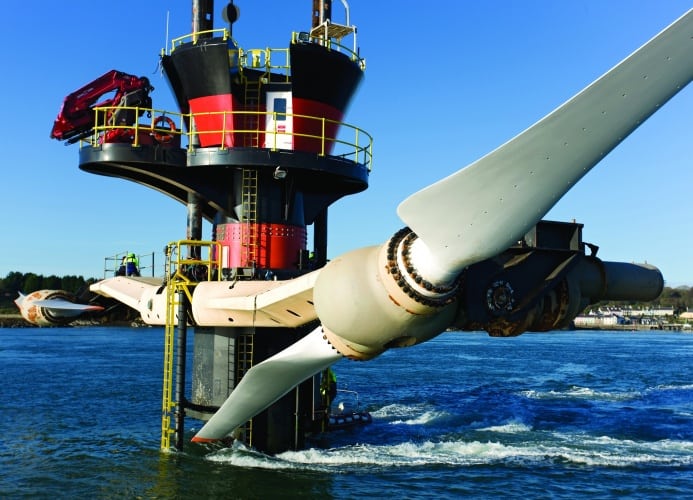German power and automation business Siemens this week confirmed its plan to divest its ocean power business, including Bristol-based Marine Current Turbines (MCT), which it acquired in full in early 2012.

A spokesperson for Siemens confirmed that the company is seeking a buyer to acquire MCT. The source confirmed that it does not yet have a buyer lined up to purchase the UK-based tidal stream technology developer.
The spokesperson said: ’We’re hoping [a] buyer will come forward [or] a potential partner. The plan is to divest. It all takes several months.’
Siemens’ exit from ocean power does not bode well for the UK marine energy sector, with Pelamis falling into administration after failing to secure adequate funding to support the rollout of its proprietary technology.
Pelamis’s administrators at KPMG reportedly hope to secure a buyer for the Scotland-based wave energy technology company and are in the process of assessing its assets.
Funding remains an issue for the marine energy sector, largely as a result of a pullback in venture capital and private equity capital flowing into cleantech. Riskier innovation plays have been hit the hardest by the paucity of institutional capital.
As early as 2011, before it was fully acquired by Siemens, MCT was seeking £100 million in project financing to support two commercial-scale projects, the company’s then CEO Andrew Tyler told Clean Energy Pipeline in an interview.
A lack of an established market and supply chain was cited as the reason behind Siemens’ decision to exit ocean power generation following a strategic review of the business.
’It’s because it’s taking too long for the technology to become commercial, both [in terms of] the market and the supply chain,’ the Siemens spokesperson said.
Siemens said in an emailed statement that it believes a dedicated tidal power industry of a ‘critical size’ will develop in the near future, but that due to the ‘limited resources’ available, it would only ever remain a niche market for Siemens.
The conglomerate bought MCT in February 2012 in a bid to expand its Solar & Hydro Division, after increasing its stake in the company to 45 per cent in November 2011. At that point, it sought to secure a leading position in the tidal stream business, predicting double-digit annual growth rates for the sector through until 2020.
The most significant progress MCT has made since deploying commercial-scale demonstration units of its SeaGen technology in Strangford Lough, Northern Ireland, in 2008 was to secure a lease to build three tidal stream projects from the Crown Estate in July this year. MCT planned to install the first phase of the project in 2017, with operations targeted for 2020. The project would involve the installation of 66 SeaGen tidal turbines throughout three phases.
If Siemens’ negotiations to find a buyer are unsuccessful, the group said it will fully consult with all potentially affected employees regarding a possible restructuring.
In the event of restructuring, Siemens said redeployment within Siemens will be prioritised, and support will be offered for redeployment or outplacement. The proposed restructuring would affect 45 employees in the Hydro & Ocean unit in Siemens’ Wind Power & Renewables division.
Siemens employs 13,760 employees in the UK, including 2,000 in its renewable energy businesses. It has 15,000 employees worldwide in the renewable energy sector, 11,000 of which work for Siemens Wind Power and associated service activities. The company has more than 25 GW of wind power installed worldwide.
This article originally appeared on www.cleanenergypipeline.com a clean energy news service operated by VB Research, a sister publication to The Engineer. The reporter, Jessica Mills Davies, can be reached at jessica.millsdavies@vbresearch.com




Project to investigate hybrid approach to titanium manufacturing
What is this a hybrid of? Superplastic forming tends to be performed slowly as otherwise the behaviour is the hot creep that typifies hot...